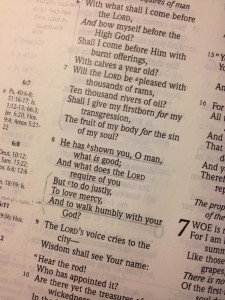I have been dissecting one of my favorite verses in Scripture, the 8th verse in the 6th chapter of the letter written by the prophet Micah in Israel. I have been wondering what Micah would have written and what it would have sounded like if he were alive to be writing in the year 2015 instead of in the 8th century B.C. The currency of the day, the items of status and worth were mentioned in terms of rams and calves and oil, burnt offerings, and even his firstborn.
Most of that can get a little removed for me, a child of the technological age, cell phones, internet, retirement and hedge funds, stocks, eBay, and luxury cars. If Micah is considering whether thousands of rams would be a sufficient gift, how do I equate that value, especially if I’m not a big sheep farmer? What about the oil — olive? crude? And where will I come up with 10,000 rivers of it this far from the Middle East (or from Greece if we’re needing olives)? And how large of a river are we talking?
The part about giving the firstborn translates quite clearly across the ages. As a mother of two, being willing to die for either one, and being distinctly unwilling to part with the first or second born (the phrase “over my dead body” comes to mind), I cringe in reading this part. If nothing else in Scripture makes God worth worshiping, this does: that he does not require the sacrifice of my children and, in fact, sacrificed his for me. Micah seems on the cusp of desperation to have included this in his potential list of God-pleasing offerings. Maybe he included it in order to underscore the next and best part of the letter: that this unspeakably painful thing for any parent is not a requirement from God in order to please him.
I began modernizing this verse in a way that fits into my world, using terminology with which I can readily relate. (For the purists out there, I’m not claiming this is God-breathed Scripture, or in any way on par with the original, nor am I intending any disrespect out of this paraphrase.) I began scribbling out modern equivalents on my white board, replacing rams and calves and oil with items of status in our world today, things by which we gauge our worth, our importance, our value. These are things that bring us a shaky comfort and security, unable to provide a lasting refuge, easily lost, and quite temporary. We humans are insistent upon surrounding ourselves with such things, with symbols of power, with perceptions and image, and being utterly concerned with how we are viewed in the eyes of those around us.
As guilty as the rest, I have used church attendance, Bible studies, even charitable giving as a means of proving my spirituality to my fellow-man. I suppose there is some value in that, if we are indeed known by our fruits; but when the heart intends these acts as a means of impressing or of checking off a list of requirements, I think Micah’s message clearly refutes the success of such measures.
In the original verse, nothing condemned the owning of rams, calves, and oil supplies, just as there is nothing wrong with having children. Whether it is success in business, being wealthy, or being a parent, Micah is not saying these things are wrong or bad. When I exchanged my own words to fit his criteria, I took that approach as well.
Please take this in the spirit it is intended, not as deeply and infallibly theological, but as a means of identifying more fully with a verse that has aided in clearing up a lot of religiosity and murkiness for me. Time and time again, it has reminded me to not get the cart before the horse, to keep my love for God central, to allow acts of respect and dignity and good-will to flow outward from there, but never become the basis for my faith. It has challenged me to be humble and right with God myself before attempting to support events that would be easy for me to make into evidence of my devotion.
Without further ado or explanations, a modern word inspired by Micah chapter 6, verse 8:
“What shall I bring when I come before the Lord and bow before the most high God? Shall I come with my Day Planner filled with busyness, my “to-do” lists and my volunteer activities? Will he be pleased with perfect housekeeping, checks written to the latest “flavor-of-the-month” cause, and flawless church attendance? Shall I give my honor-roll student, my pride and joy, the one who will carry on my name and through whom I vicariously live, to atone for my insecurity, neuroses, failed diets, and loneliness? The God who pursues has shown me what is good and what is required of me: To do the right thing (even when it hurts). To love mercy (as much for others as for myself). To walk humbly in my relationship with my God (knowing we are all so desperately in need of grace).”
This is enough of a standard to keep me occupied for the rest of my life and yet, light enough to continually renew my soul and relieve my worry and stress. This is what is good and required of me. That is all. Everything else will flow from these simple instructions, with no pretense or fears about impressing and proving. Light and easy and enough to keep me dependent upon that relationship for all of my days.

I love this one, Mom. Your paraphrase rocks.
LikeLiked by 1 person
Thanks, Bri… as always, YOU rock. 🙂
LikeLike